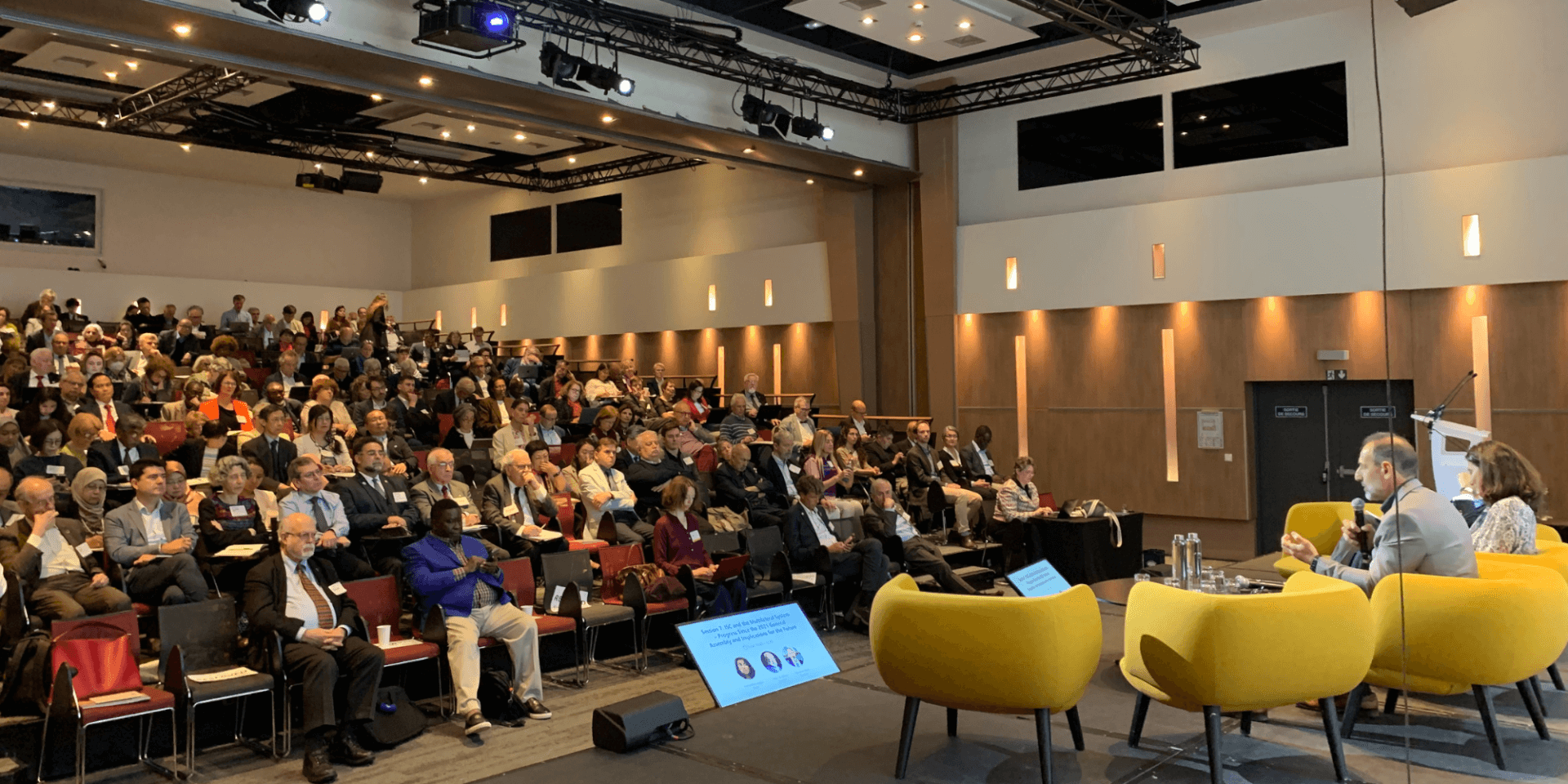
The ISC’s Mid-term meeting of members, Capitalizing on Synergies in Science kicked off with a full day of panel sessions including the “Evolution of science in a global context”, exploring how institutions representing science should and must adapt in order to address critical challenges in building knowledge driven societies, and “Science diplomacy in times of crisis”, addressing the positioning and impacts of scientific collaboration in the context of armed conflicts.
Globally, scientists face an era of polycrisis: the COVID-19 pandemic, political populism and online misinformation driving distrust in science and institutions – as well as interlocking global conflicts that threaten individual scientists and irreplaceable data.
“Faith in science has been challenged. Disinformation abounds. And yet the world needs science, both basic and applied, more than ever,” says ISC President Peter Gluckman. “We cannot afford, in this time of multiple existential crises, to have a lack of ambition.”
More than 100,000 scientists and researchers around the world are displaced, unable to continue their work because of conflict or instability, says Mathieu Denis, Senior Director and Head of the ISC’s Centre for Science Futures.
“Are we in a position collectively to lose all that workforce, all that work, all that knowledge?” Denis asks.
Conflict threatens the entire scientific ecosystem: “We’re losing data and databases; we’re losing clinical trials and we are losing research data. We need policy and action frameworks that allow us to protect individuals, knowledge and research and institutions,” Denis says.
“From our region, we have seen the results of rupture – when institutions break down, where there’s a break in generations of scholarship. Once there’s a rupture, it’s very difficult to rebuild,” says Seteney Shami, Director General of the Lebanon-based Arab Council for the Social Sciences.
Shami says scientists and institutions need a different approach to the idea of crisis – and to put to rest the idea that critical work can wait until things go back to the way they were. “We have to think about crisis as an enduring context, not as something that begins and ends,” she says.
One crucial lesson, she says, is the value of holding on and working to maintain as much of the scientific ecosystem as possible: “Continuity, almost at any cost. Continuity is worth it.”
As Russia’s full-scale invasion of Ukraine began, the Polish Academy of Science immediately started looking for ways to help colleagues in Ukraine continue their work. They have now hosted 218 Ukrainian fellows, organized training for almost 600 Ukrainian scientists and recently set up a grant program for Ukrainian research teams.
The Academy’s association of PhD students is also helping Ukrainian colleagues continue their research by coordinating with foreign laboratories to analyse samples.
“All of these actions would not be possible without intensive cooperation between academies of sciences from all over the world and the friendly support of international scientific organizations,” says Magdalena Sajdak, Director of the Polish Academy of Sciences Scientific Center in Paris.
The Academy’s recent call for grant applications from Ukrainian scientists was overwhelmed within four days. More financial support from the global science community for similar programs is needed, Sajdak says – as well as programs and reduced membership fees for scientists in exile.
Resilience and working through crises remains a consistent reality for many scientists around the world, says Kathy Whaler, President of the International Union of Geodesy and Geophysics.
Many of her colleagues are based in dangerous environments, and risk their lives to measure and report geophysical data to the world. “We need to maintain the scientists operating and the researchers using those data, and make sure that those data are fully available, properly documented, properly archived for everybody to use,” she says.
Finding the means to continue that work in an independent way continues to be a critical problem for many scientists based in the Global South, says Ava Thompson, Secretary General of the International Union of Psychological Science.
“A significant proportion of scientific research depends on funding from government and other regional bodies, with vested interests in certain types of research. While in many cases interests are aligned, in increasing situations, scientific priorities are determined by entities which are at times not congruent with serving humanity,” she says.
“In other cases, limited access to funding significantly undermines science, and by extension, humanity’s development,” Thompson says.
Scientists also face increasing political pressure, multiplied by the explosion of online misinformation, says Ian Wiggins, Director of International Affairs with the Royal Society in the UK.
“It’s something we’ve seen over history, but it feels like this is a particular moment, where the voice of science and reason is portrayed as the enemy, as ‘These are a bunch of elites out to get you,’” Wiggins says. “There’s a real nefarious line from some political leaders out there.”
Part of addressing this challenge may involve a change in how science is communicated, he suggests: “There’s a kind of tone that’s been in a lot of our communications around this – one of a bit of humility, recognizing where the limits of science are,” he says. “It’s a much more nuanced conversation.”
The international science jamboree continues with sessions on the Inclusion and Participation of Women in Science and Increasing the ISC Regional Presence and Impact.
Freedom and Responsibility in Science, with Nature
On 1 May 2023, the International Science Council launched a series of six episodes on the theme of Freedom and Responsibility in Science, in partnership with Nature.

Discover the new podcast series from the International Science Council’s Committee for Freedom and Responsibility in Science (CFRS), which explores what living in a world of crisis and geopolitical instability means for science and scientists.
This series features interviews with refugee and displaced scientists who share their science, their stories of displacement, and their hopes for the future.